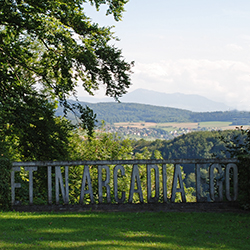
Historical gardens, truth and fiction
International Landscape Study Days
2019, fifteenth edition
Thursday 21st and Friday 22nd February
Readings, restorations, critical interpretations of historical models in the 20th and 21st century landscape
The 15th edition of the study days seeks to underline the importance of keeping alive both research and exchanges around the topic of “historical gardens” so that they may continue playing a germinal and proactive role in the context of the debate on contemporary landscape, guiding all levels of courses of study in this field, and on the places where one is called upon to intervene, in settings where this historical heritage is extensively and deeply embodied.
In the late 20th century especially – also thanks to the Foundation’s contribution – there was a significant surge in research, initiatives and experiences that were then fundamental in highlighting the importance of historical gardens for landscape study and care. During these study days, works will therefore be building on this recent era, and aim at underlining the present need, also by institutions, to continuously foster the progress of theoretical and philological research and the deployment of original and up-to-date methods and experimentations.
Hence the idea of starting – with a seemingly wry and somewhat irreverent take – from the times when, in the last century, history became a means of replicating shapes and models. This even led to actual copies of gardens, reflecting an approach to the past that we can now take a more informed look at, also in light of the risks that contemporary culture faces when dealing with historical landscapes. At the same time, many examples will be provided during the study days, examining the same time frame, in which work in the field of historical gardens has been carried out in the name of consistency. This featured an interest in knowledge as well as in the critical interpretation of history and of the necessary transformations that are guided by the wisdom and understanding underlying each gesture and inspiring every decision.
There will be two sessions. The first, the topic of which is “The game of replicas. Authenticity, use and migration of historical models and documents, copies”,will offer a series of early or more recent experiences linked to the use of historical models over the course of the 20th century. The session opens with the widely documented case of the “migration” of Italian gardens overseas and moves on to more contemporary phenomena involving the reintroduction of historical shapes in different contexts.
The second day, on the topic of “Exercises in critical reading. Examples from the twentieth century and the current milieu”, picks up the thread of a different approach to history throughout the 20th century – the unfolding of critical interpretation, aimed at finding in gardens the grounds for a design that does not maintain historical shapes unaltered, but questions the continuity of places, the contexts of origin and the presence of those who live there and take care of their future.
At the end of the first day, experiences on the topic of the recreation of gardens and landscape in cinema will be presented.
In addition to several lectures, the second day will feature a brief account of the outcome of the design workshop on the Villa Farsetti garden in Santa Maria di Sala, held by the Foundation in 2018.
An additional event is organised to present the book Prati urbani. I prati collettivi nel paesaggio delle città/City meadows. Community fields in urban landscapes, which was recently published by the Foundation jointly with publisher Antiga and edited by Franco Panzini, based on the contents of the 2016 Landscape Study Days Prati, commons.
